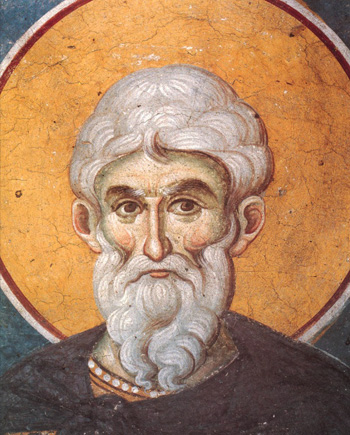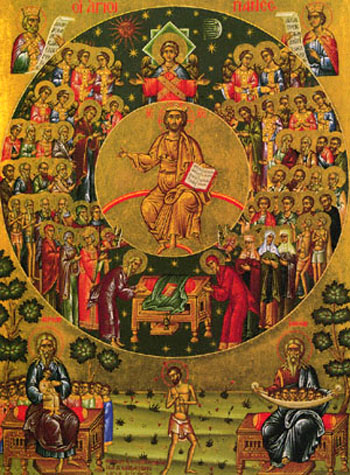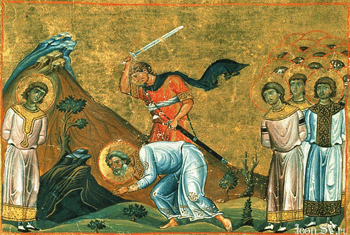Saints of the Day
 |
 |
 |
 |
 |
 |
 |
St. Arethas, Martyr - July 27
Biographical selection:
In the book Os Reis da Etiópia [The Kings of Ethiopia] by Pereira de Santana, we find the words of St. Arethas to the Catholics of Nadjran, before he was martyred by the tyrant King Dounaan in 523. These are his words:
"Listen to me, O inhuman King, doctors of the Synagogue, Himyarite apostates, confederacy of barbarians, illustrious courtesans and enlightened inhabitants of Nadjran.
 "Fellow companions, friends, relatives and others, be ye noble or plebeian, Catholic or unfaithful, let all hear me. I beg this of you, because I speak to all. I could well say that I sing to you now, if you consider that through the years I became the country's swan that conserves purity of mind and joy of heart, without fear of death.
"Fellow companions, friends, relatives and others, be ye noble or plebeian, Catholic or unfaithful, let all hear me. I beg this of you, because I speak to all. I could well say that I sing to you now, if you consider that through the years I became the country's swan that conserves purity of mind and joy of heart, without fear of death.
"I speak principally to you, O King. Even more than the wild beasts you are inhuman, as I have said. I answered the hundred unjust accusations you made against me, and you condemned me. It is true that I am, as you say, the total cause, turbine and head of the steadfastness and resistance of the people of Nadjran, but not of their suffering slaves.
"They resisted without following the advice of the elders, which is always more discrete and well-founded. They despised my advice without considering that it was as ripe as my white hair. In this contempt they opened themselves to danger, and in that resistance to counsel they lost themselves.
"I persuaded all to persevere in their opposition to you, for even though your forces were superior to ours; our walls were stronger than your weapons and our hearts still more untenable than our walls. With what power did Gideon enter the fight against so many thousands of Madianites? Since he, supported by Heaven, could conquer so many soldiers with so few, why should we not triumph over your power since it is certain that we have the protection of the Lord of Heaven and yet stronger forces than those of that Prince (Gideon)?
"You should not imagine that you are the author of the chastisement that we experienced, but an instrument. God punished us through your hands for our temerity in believing you, O King, who besides being a traitor to your Sovereign, are rebelling against your Creator.
"Call me, if you wish, O tyrant, the watchman of the honor of God! I invoke this Lord against you because you have despised His Law, destroyed His temples, profaned His altars and, finally, exterminated His priests.
"Know that, imitating the same Prophet who predicted the death of so many kings, I now assure you that shortly you will be stripped of this purple mantle and deposed from the throne. Thus shall God subject the whole Ethiopian Empire to (the Ethiopian King) Elesbaan, excluding not even one of your domains. This glorious and powerful Prince will be the restorer of our defeated Christendom. Making reparation to Jesus Christ, he will prevail so mightily against you that, through him, an admiring Nadjran will see its churches restored and you prostrate at his feet like a proud edifice that has fallen and will never be restored."
Comments of Dr. Plinio:
Well then, let us try to translate this superb speech to modern language.
The beginning of St. Arethas' exhortation is magnificent. He first enumerates his enemies: the inhuman King, the doctors of the Synagogue, the Himyarite apostates and the confederacy of barbarians. They form an ensemble that seems to encompass all the evil in the world. All this evil is united against the Saint, who is alone and will be martyred. But before dying, he speaks the words he wants to be heard. The introduction is not without grandness.
 He then asks all to listen to what he says, although, he notes, he might better say that he sings. You know the legend that when the swan dies it sings and that the last song of the swan is of an extraordinary beauty. The idea is exquisite: We imagine a swan that knows it will perish and sings before it dies. It is a song in which all the swan-ness of the swan appears, a song transformed into haunting notes that echo on the water, resound on the trees and die in the sky. It is very poetic. The Saint says that his last words will be like the swan's song. It is a very Eastern way of presenting things.
He then asks all to listen to what he says, although, he notes, he might better say that he sings. You know the legend that when the swan dies it sings and that the last song of the swan is of an extraordinary beauty. The idea is exquisite: We imagine a swan that knows it will perish and sings before it dies. It is a song in which all the swan-ness of the swan appears, a song transformed into haunting notes that echo on the water, resound on the trees and die in the sky. It is very poetic. The Saint says that his last words will be like the swan's song. It is a very Eastern way of presenting things.
He says that he had become the swan of the country because he conserved a purity of mind and a joy of heart without fear of death. He is pure in his ideas and joyful in his soul although he will die soon. With this purity and joy he prepares his swan song. It is an introduction of an extraordinary beauty.
He addresses the King. We perceive by the text that the King tried to extinguish the Faith in the people of Nadjran but they resisted and the King imprisoned the Saint because he was the head of the resistance. We have the impression also – the text is not very clear – that the Nadjranese made a strong resistance. He told them to not do so because it was not wise, but they did not listen to him.
Nonetheless, he does not fail to praise the courage of the Nadjranese with a beautiful expression: that the weapons of the King were not as strong as the walls of the Nadjranese and that the their hearts were still stronger than their walls. Therefore, there was no reason for them to have been defeated by this King other than it was a chastisement they deserved for having trusted the King.
[Editor: In fact, against the counsels of Arethas, the city surrendered to King Dounaan, who immediately broke the word he had given and sought to compel the inhabitants to renounce Christ. Led by St. Arethas, hundreds of martyrs, including women, children and babes, valiantly withstood his threats, and were beheaded and burned.]
St. Arethas was perfectly right because we should never trust a heretic. A man who has broken with God is an impious man in whom we cannot deposit any trust. The fact that they placed trust in the King – this refers to a previous episode that is not revealed here – explains why they were defeated.
St. Arethas tells the King not to imagine that he has conquered by his valor. It was God who gave the victory to him to chastise the people.
 But then he warns the King that the faith of the people will be restored. A new Emperor of Ethiopia would come – St. Elesbaan – to rebuild Christendom and he would cast King Dounaan to the ground in such way that his power would be reduced to nothing.
But then he warns the King that the faith of the people will be restored. A new Emperor of Ethiopia would come – St. Elesbaan – to rebuild Christendom and he would cast King Dounaan to the ground in such way that his power would be reduced to nothing.
With this you see the economy of God.
There was an impious King, Dounaan, and there was a people who were unfaithful but still Catholic. God wanted to punish the lack of vigilance of that people who trusted an impious King. God allowed the bad King to defeat them and to persecute the Catholics. He used the bad King as a scourge to whip the tepid people.
But the bad King sinned by persecuting the Catholics. So, God elected a man from His right hand, St. Elesbaan, and led him to defeat the impious King. With this, that colligation of evil – the doctors of the Synagogue, the Himyarite apostates and all the others – was defeated and Christendom was rebuilt in Ethiopia.
I cannot prevent myself from calling your attention to the marvelous beauty of the Holy, Catholic Apostolic and Roman Church. Everywhere that she flourishes – as long as men correspond to her influence – what is better sprouts in every form, degree and fashion.
You see here the marvels that happened in the Ethiopia, which afterwards was cut off from Christendom and fell into the miserable monophisite heresy in which it is still entangled today. There was a time when Ethiopia was a truly Catholic nation.
The episode we read today is worthy of a place in the best epochs of the Catholic Spain. Why? Because it is not Spain that is magnificent, it is not Ethiopia that is magnificent; it is the Holy Catholic Church that is magnificent! Where the Church enters, marvels like this start to happen. The only condition is that men say "yes" to the influence of the Church.
 But, as soon as she leaves the scene, everything decays, everything falls to the ground and the Himyarite apostates and impious kings appear; Communism appears, and so on. The true fountain of grandness, beauty, good, righteousness, sanctity, order and culture is the Catholic Church. Outside the Catholic Church good things can be born, but they stagnate and decay.
But, as soon as she leaves the scene, everything decays, everything falls to the ground and the Himyarite apostates and impious kings appear; Communism appears, and so on. The true fountain of grandness, beauty, good, righteousness, sanctity, order and culture is the Catholic Church. Outside the Catholic Church good things can be born, but they stagnate and decay.
Take for example the cultures of China and Egypt. They were extraordinary cultures, but they reached a certain apex and then stopped, they did not progress. This is the immobility of the East, stagnant and rotting.
However, when you consider Catholic culture it is like a jet stream of crystal clear water shooting through the stagnant waters. The West progressed because of the Church. And, to the degree that it still progresses, it is because of the acquired speed of an engine that has already stopped working. It is the acquired speed of our past Christendom, which had Catholic Faith.
We should understand that to love God above everything and our neighbor for the love of God means to love the Holy Catholic, Apostolic and Roman Church above everything and our neighbor as long as he is united to the Catholic Church.
Everything that is touched by the Church and receives her influence becomes admirable; everything that is outside of her, even should it merit admiration, can only receive an admiration with restrictions. Thus do we understand that we should have a veritable passion and extreme admiration for the Holy Catholic and Apostolic Church, the true fatherland of our souls and the true prefigure of the Glorious Church to which we wish to belong in Heaven.


The Saint of the Day features highlights from the lives of saints based on comments made by the late Prof. Plinio Corrêa de Oliveira. Following the example of St. John Bosco who used to make similar talks for the boys of his College, each evening it was Prof. Plinio’s custom to make a short commentary on the lives of the next day’s saint in a meeting for youth in order to encourage them in the practice of virtue and love for the Catholic Church. TIA thought that its readers could profit from these valuable commentaries.
The texts of both the biographical data and the comments come from personal notes taken by Atila S. Guimarães from 1964 to 1995. Given the fact that the source is a personal notebook, it is possible that at times the biographic notes transcribed here will not rigorously follow the original text read by Prof. Plinio. The commentaries have also been adapted and translated for TIA’s site.
In the book Os Reis da Etiópia [The Kings of Ethiopia] by Pereira de Santana, we find the words of St. Arethas to the Catholics of Nadjran, before he was martyred by the tyrant King Dounaan in 523. These are his words:
"Listen to me, O inhuman King, doctors of the Synagogue, Himyarite apostates, confederacy of barbarians, illustrious courtesans and enlightened inhabitants of Nadjran.

St Arethas of Nadjran, martyred for defending the Faith in Ethiopa in the 6th century
"I speak principally to you, O King. Even more than the wild beasts you are inhuman, as I have said. I answered the hundred unjust accusations you made against me, and you condemned me. It is true that I am, as you say, the total cause, turbine and head of the steadfastness and resistance of the people of Nadjran, but not of their suffering slaves.
"They resisted without following the advice of the elders, which is always more discrete and well-founded. They despised my advice without considering that it was as ripe as my white hair. In this contempt they opened themselves to danger, and in that resistance to counsel they lost themselves.
"I persuaded all to persevere in their opposition to you, for even though your forces were superior to ours; our walls were stronger than your weapons and our hearts still more untenable than our walls. With what power did Gideon enter the fight against so many thousands of Madianites? Since he, supported by Heaven, could conquer so many soldiers with so few, why should we not triumph over your power since it is certain that we have the protection of the Lord of Heaven and yet stronger forces than those of that Prince (Gideon)?
"You should not imagine that you are the author of the chastisement that we experienced, but an instrument. God punished us through your hands for our temerity in believing you, O King, who besides being a traitor to your Sovereign, are rebelling against your Creator.
"Call me, if you wish, O tyrant, the watchman of the honor of God! I invoke this Lord against you because you have despised His Law, destroyed His temples, profaned His altars and, finally, exterminated His priests.
"Know that, imitating the same Prophet who predicted the death of so many kings, I now assure you that shortly you will be stripped of this purple mantle and deposed from the throne. Thus shall God subject the whole Ethiopian Empire to (the Ethiopian King) Elesbaan, excluding not even one of your domains. This glorious and powerful Prince will be the restorer of our defeated Christendom. Making reparation to Jesus Christ, he will prevail so mightily against you that, through him, an admiring Nadjran will see its churches restored and you prostrate at his feet like a proud edifice that has fallen and will never be restored."
Comments of Dr. Plinio:
Well then, let us try to translate this superb speech to modern language.
The beginning of St. Arethas' exhortation is magnificent. He first enumerates his enemies: the inhuman King, the doctors of the Synagogue, the Himyarite apostates and the confederacy of barbarians. They form an ensemble that seems to encompass all the evil in the world. All this evil is united against the Saint, who is alone and will be martyred. But before dying, he speaks the words he wants to be heard. The introduction is not without grandness.

He poetically proclaimed himself the swan of Ethiopia who would make his last swan song
He says that he had become the swan of the country because he conserved a purity of mind and a joy of heart without fear of death. He is pure in his ideas and joyful in his soul although he will die soon. With this purity and joy he prepares his swan song. It is an introduction of an extraordinary beauty.
He addresses the King. We perceive by the text that the King tried to extinguish the Faith in the people of Nadjran but they resisted and the King imprisoned the Saint because he was the head of the resistance. We have the impression also – the text is not very clear – that the Nadjranese made a strong resistance. He told them to not do so because it was not wise, but they did not listen to him.
Nonetheless, he does not fail to praise the courage of the Nadjranese with a beautiful expression: that the weapons of the King were not as strong as the walls of the Nadjranese and that the their hearts were still stronger than their walls. Therefore, there was no reason for them to have been defeated by this King other than it was a chastisement they deserved for having trusted the King.
[Editor: In fact, against the counsels of Arethas, the city surrendered to King Dounaan, who immediately broke the word he had given and sought to compel the inhabitants to renounce Christ. Led by St. Arethas, hundreds of martyrs, including women, children and babes, valiantly withstood his threats, and were beheaded and burned.]
St. Arethas was perfectly right because we should never trust a heretic. A man who has broken with God is an impious man in whom we cannot deposit any trust. The fact that they placed trust in the King – this refers to a previous episode that is not revealed here – explains why they were defeated.
St. Arethas tells the King not to imagine that he has conquered by his valor. It was God who gave the victory to him to chastise the people.

St. Arethas & the multitude of inhabitants of Nadjran who gave their lives rather than deny Christ
With this you see the economy of God.
There was an impious King, Dounaan, and there was a people who were unfaithful but still Catholic. God wanted to punish the lack of vigilance of that people who trusted an impious King. God allowed the bad King to defeat them and to persecute the Catholics. He used the bad King as a scourge to whip the tepid people.
But the bad King sinned by persecuting the Catholics. So, God elected a man from His right hand, St. Elesbaan, and led him to defeat the impious King. With this, that colligation of evil – the doctors of the Synagogue, the Himyarite apostates and all the others – was defeated and Christendom was rebuilt in Ethiopia.
I cannot prevent myself from calling your attention to the marvelous beauty of the Holy, Catholic Apostolic and Roman Church. Everywhere that she flourishes – as long as men correspond to her influence – what is better sprouts in every form, degree and fashion.
You see here the marvels that happened in the Ethiopia, which afterwards was cut off from Christendom and fell into the miserable monophisite heresy in which it is still entangled today. There was a time when Ethiopia was a truly Catholic nation.
The episode we read today is worthy of a place in the best epochs of the Catholic Spain. Why? Because it is not Spain that is magnificent, it is not Ethiopia that is magnificent; it is the Holy Catholic Church that is magnificent! Where the Church enters, marvels like this start to happen. The only condition is that men say "yes" to the influence of the Church.

The beheading of St. Arethas
Take for example the cultures of China and Egypt. They were extraordinary cultures, but they reached a certain apex and then stopped, they did not progress. This is the immobility of the East, stagnant and rotting.
However, when you consider Catholic culture it is like a jet stream of crystal clear water shooting through the stagnant waters. The West progressed because of the Church. And, to the degree that it still progresses, it is because of the acquired speed of an engine that has already stopped working. It is the acquired speed of our past Christendom, which had Catholic Faith.
We should understand that to love God above everything and our neighbor for the love of God means to love the Holy Catholic, Apostolic and Roman Church above everything and our neighbor as long as he is united to the Catholic Church.
Everything that is touched by the Church and receives her influence becomes admirable; everything that is outside of her, even should it merit admiration, can only receive an admiration with restrictions. Thus do we understand that we should have a veritable passion and extreme admiration for the Holy Catholic and Apostolic Church, the true fatherland of our souls and the true prefigure of the Glorious Church to which we wish to belong in Heaven.

 | |
|
|
The texts of both the biographical data and the comments come from personal notes taken by Atila S. Guimarães from 1964 to 1995. Given the fact that the source is a personal notebook, it is possible that at times the biographic notes transcribed here will not rigorously follow the original text read by Prof. Plinio. The commentaries have also been adapted and translated for TIA’s site.


